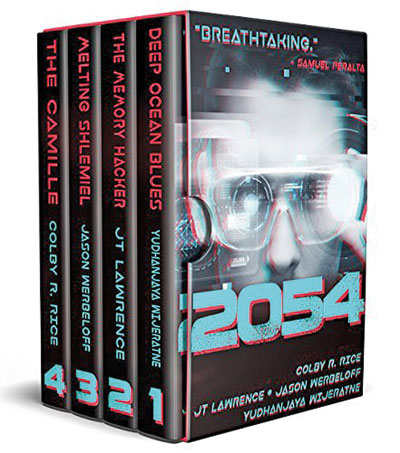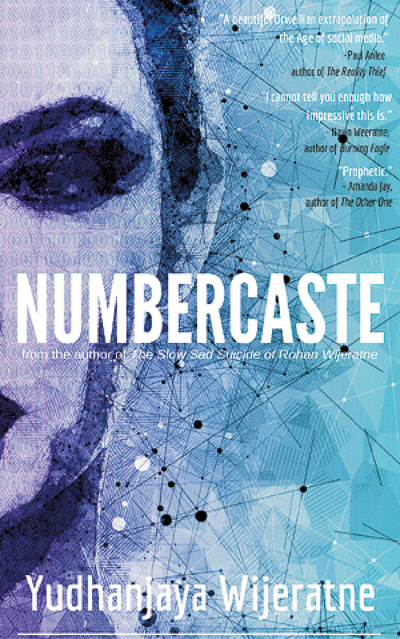Arts
Post Numbercaste, Yudhanjaya dreams up more worlds
Yudhanjaya Wijeratne is the kind of person who greets life with a huge bear hug and jovial punch. Genial with an engaging smile, he is lucid and comfortable whether the conversation steers towards history, literature, or technology. Former tech journalist, blogger and currently data scientist, Yudhanjaya’s deepest passion has been the stimulating speculation, unending invention, and the steely spires of science fiction.

Yudhanjaya Wijeratne
Numbercaste, his last novel, left a memorable trail with the unique idea that is at its heart: a system called the Number which gives each person a standing in society based on the number of minds he influences- the number of lives he touches. Your ‘Number’ solely determines your standing, discarding old standards like money or family. This is a system that China is now actually contemplating to establish (though maybe not with the same intricacy as in the novel).
Since the success of Numbercaste, Yudhanjaya has been busy dreaming up more worlds. Tomorrow, June 18, will see the release of 2054, the collaborative science fiction anthology produced by Yudhanjaya and three other writers: JT Lawrence and Jason Werbeloff from South Africa, and Colby R. Rice of the USA. These are cyberpunk narratives, Yudhanajaya says, explaining that cyberpunk is a genre where the characters are mostly marginalized, alienated loners living on the edge of future societies where daily life is impacted by rapid technological change. What will the world look like in 2054? This is the question which the writers answer with verve and imagination.
Yudhanjaya’s contribution for 2054 will be a story on a thorium mine at the bottom of the Bay of Bengal (thorium research actually shows it’s a good replacement for uranium; much safer, and most of it located between Goa and Sri Lanka). This, hopefully, will be the beginning of an international annual anthology where the four writers spin chronicles of a shared universe, and follow stories in different continents.
While this is to happen this week, Yudhanjaya has more exciting news for us in the pipeline. He has scored perhaps the largest deal that a Sri Lankan writer has got from a Big Five publisher- in terms of number of books. Harper Collins has acquired the rights for Numbercaste as well as three new novels- a trilogy called Commonwealth Empires- with a final nonfiction book: altogether five.
The Commonwealth Empires series is set in an alternate world- the result of the First World War not happening.
Archduke Ferdinand of Austria is not shot at, and the quick succession of incidents that actually followed never transpires.
This means a world that is unrecognizably divided among mega empires. The year is around 2030 and the British Commonwealth holds on magnificently (because India was not given up due to there being no war-time restraints on the economy); Communism too has not come so the Tsar rules the Russias; the Germanic Federation of States continues to exist and the great empire of China, behind the bamboo curtain, has conquered Australia. Ceylon, meanwhile, with its strategic position, is a meeting point where the trade interests of the British Empire and the Chinese Empire meet.
In the trilogy Yudhanjaya explores the great political forces at play above and beyond Ceylon. He delves into a lot of issues which would be impossible to explore without inventing a whole fictional world. These range from racism and colonialism to machine intelligence, the nature of consciousness, international economy and the possible technologies that might actually have risen, including British “tin soldiers”- 60 foot walking dreadnoughts- and the Germanic “crusader knights”, raised from birth for battle.
The first of the trilogy, The Inhuman Race, will come out this September, the sequels coming a year after the other.
The work of nonfiction is a book on Big Data- on how to weaponize it for good- that he has co-authored together with Prof. Rohan Samarajiva who is the chairman of ICTA and Sriganesh Lokanathan who is the head of big data at the LIRNEasia big data unit.
Yudhanjaya was surprised by the deal being accepted by Harper Collins within a very short time- in fact a week.
As a leading sci-fi writer he is quite ready to help fellow practitioners of the art: he urges anyone who is venturing into science fiction writing to ‘get in touch’. The advice he deems most vital to be imparted is- pay attention to the story structure. Conflict is what makes a story interesting, he says, pointing out that a good story is one where ordinary people face extraordinary circumstances- or maybe extraordinary people having to deal with extraordinary things. The conflict, he says, drives the story forward.
For the Sri Lankan sci-fi writer, there awaits a great, untapped rich mine in our traditions of mythology. There is exhilarating potential in projecting ancient myths, folklore and culture into the future. It would also be fresh and exciting to weave into our narratives more of our own island way of looking at the world.
As we end our excitingly futuristic chat and the traffic outside begins to complain, I find myself wondering whether real 2030- when it comes- will be better or worse than Yudhanjaya’s fantastic alternate.

